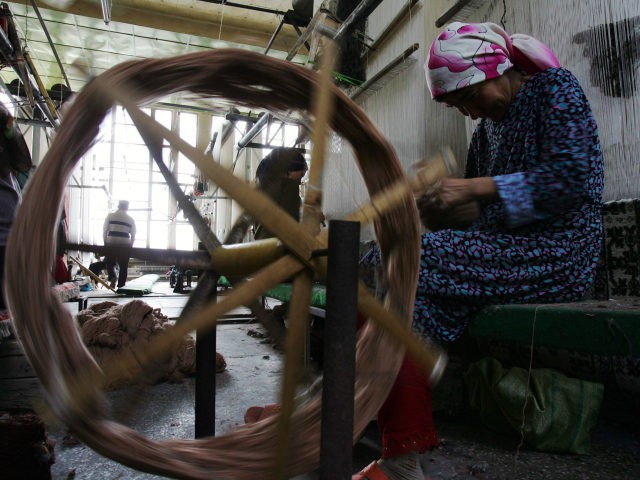Members of the Congressional-Executive Commission on China (CECC) introduced a bipartisan bill to ban all imports from western Xinjiang, China, on Wednesday, asserting it is impossible to keep items manufactured by Muslim slaves out of America otherwise.
The Chinese Communist Party has built hundreds of concentration camps in Xinjiang, its largest and westernmost province, in the past two years to imprison the region’s Muslims, the vast majority of which are members of the ethnic Uyghur majority indigenous to the region. China claims these camps are “vocational training centers” used to help unskilled Uyghurs develop talents that match jobs in the Chinese market. Uyghur survivors of the camps say they are used to kill, rape, torture, indoctrinate, and enslave them. Satellite images of the camps show that many are equipped with factories, where survivors say they are forced to work arduous hours manufacturing goods the Chinese government profits from for little to no money.
Chinese officials claimed that the Uyghurs enslaved in the camps had all “graduated” from “vocational training” in December. This month, a study by an Australian think tank revealed that “graduation” meant that large numbers of the estimated 1 million to 3 million imprisoned Uyghurs had been transferred nationwide by force to fill labor gaps in factories in other parts of the country.
The study found that 83 internationally operating companies – including American companies like Nike, Apple, and Gap – used factories featuring Uyghur slaves to manufacture products or components for products.
Introduced alongside the legislation, the Uyghur Forced Labor Prevention Act, the CECC published a report detailing the extent of the use of Uyghur slave labor in China and how difficult it is for a company to verify that the products they import from China were not built by slaves. The report accuses China of crimes against humanity, an international crime that any court in the world has jurisdiction to prosecute, and urges Congress to block all imports with ties to Xinjiang.
“The severe human rights abuses, torture, political indoctrination, forced renunciations of faith, and widespread and systematic forced labor occurring in mass internment camps may constitute crimes against humanity under international law,” the report concluded. “As this report details, forced labor exists both within the XUAR’s [Xinjiang Uyghur Autonomous Region] system of mass internment camps, and throughout the region, and is confirmed by the testimony of former camp detainees, satellite imagery, and recently leaked Chinese government documents.”
The report listed carpets, cell phones, noodles, shoes, tea, and all sorts of clothing, housewares, and electronics among the products that China is forcing imprisoned Uyghurs to manufacture in captivity, while also being forced to endure communist indoctrination, abandon the principles of their Muslim faith, and learn Mandarin, a language that is not native to Xinjiang. Among the companies the commission concludes to be benefitting from this labor are Coca-Cola, Nike, Kraft Heinz, and Campbell Soup.
The report clearly states, “due diligence in Xinjiang is not possible.”
The Uyghur Forced Labor Prevention Act addresses the results of the report by banning all imports from Xinjiang unless a company can clearly prove that the products were not made by slaves. The burden of proof falls on the person or company trying to import an item from Xinjiang to offer “clear and convincing evidence” that the imports “were not produced wholly or in part by convict labor, forced labor, or indentured labor under penal sanctions.”
The bill enjoys bipartisan support from the heads of the CECC. In the House of Representatives, Rep. Jim McGovern (D-MA) will introduce the bill alongside 11 other Congressmen of both parties. Senator Marco Rubio (R-FL) will introduce the Senate version of the bill, along supported by a bipartisan group of nine senators.
“Any U.S. or international company with operations in Xinjiang or working with the Xinjiang government to source labor to other parts of China should reconsider whether they want to be producing products under the aegis of a regional government that is committing “crimes against humanity,” Rep. McGovern said in a statement to the press. “It is long past time for companies to reassess their operations and supply chains in Xinjiang and find alternatives that do not exploit and violate individuals’ human rights.”
Rubio similarly asserted that “companies have a moral duty and responsibility to prove that their sourced products have been produced without forced labor.”
If passed, the bill will likely significantly curb the import of goods made by Uyghur forced labor. The CECC has heard expert testimony that some of these goods have already made it into America, in particular baby clothing sold at Costco manufactured in Xinjiang. As the bill is limited to Xinjiang, it will not address slave labor in other states bolstered by the mass transfer of imprisoned Uyghurs to replace workers in factories shut down by the Wuhan coronavirus outbreak.
The Australian Strategic Policy Institute (ASPI)’s report published last week indicated that companies manufacturing for Nintendo, Sony, Google, Lacoste, and a total of 83 international companies were being kept open in part by replacing the Han Chinese workers that typically work there with Uyghurs. The Chinese Communist Party, the report revealed, has implemented government programs to encourage companies to “hire” Uyghur slaves at reduced prices, offering tax breaks for using Uyghur labor.
“The Chinese government has facilitated the mass transfer of Uyghur and other ethnic minority citizens from the far west region of Xinjiang to factories across the country,” ASPI revealed. “Under conditions that strongly suggest forced labour, Uyghurs are working in factories that are in the supply chains of at least 83 well-known global brands in the technology, clothing and automotive sectors, including Apple, BMW, Gap, Huawei, Nike, Samsung, Sony and Volkswagen.”

COMMENTS
Please let us know if you're having issues with commenting.